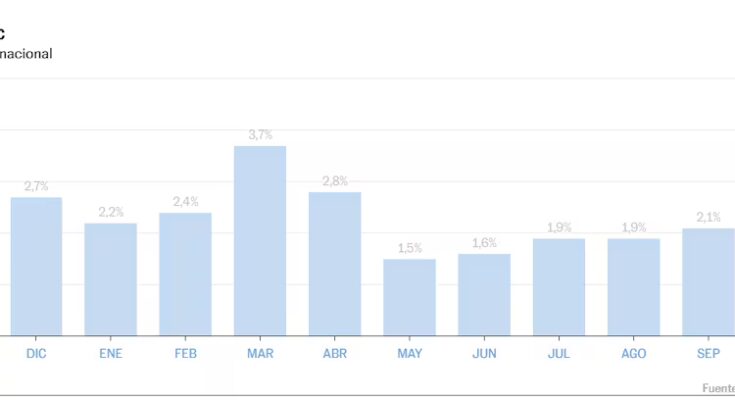The consumer price index began to grow again in Argentina and, for the second consecutive month, remained above two points. According to official data released this Wednesday, inflation was 2.3% in October, a month characterized by mid-term elections – in which Javier Milei’s government was imposed -, financial instability and the economic bailout of the United States. Throughout the year, price increases accumulate by 24.8%.
The Ultra government, which has control of inflation as its main political capital, highlighted that the year-on-year price change was 31.3%, “recording 18 consecutive months of deceleration compared to the same month of the previous year”. According to a statement from the Ministry of Economy, this is the “lowest difference since July 2018”.
In the text released by Minister Luis Caputo, it was chosen to underline that “the disinflation process continued despite the decline in the demand for money generated by electoral uncertainty and the opposition’s attempts to break the fiscal anchor in recent months”. For Caputo, “this reflects the solidity of the economic program and the success of the fiscal and monetary order in reducing the impact of financial volatility on the purchasing power of Argentines.”
The Economy Minister’s allusion to the opposition’s attempts refers to the laws passed by Congress, with a large majority, to reverse Milei’s drastic chainsaw cuts in sensitive sectors, such as healthcare, education and assistance for people with disabilities.
The Institute for Statistics and Census (Indec) specifies that, in October, the largest price increases in the country were recorded in the sectors of transport (3.5%), accommodation, water, electricity, gas and other fuels (2.8%), goods and services, clothing, alcoholic beverages and tobacco (2.4%). At the other extreme, the smallest increases came from equipment and home maintenance, as well as recreational activities and culture (1.6%).
The consumer price index had broken the two-point barrier in September, reaching 2.1%, after remaining between May and August between 1.5 and 1.9%. That was the period with the lowest inflation since Milei took office. In December 2023, when he entered the Casa Rosada, the far-right president ordered a sharp devaluation of the peso, deregulation of the economy and a strong monetary and fiscal adjustment. Inflation reached a monthly rate of 25.5% at the end of that year and an interannual variation of 289.4% in April 2024. Since then, a process of low inflation and declining consumption has begun.
October was a particular month in Argentina: Milei arrived at the legislative elections on Sunday 26th politically weakened, with his economic plan foundering and the peso falling against the dollar. The $20 billion bailout granted before the election by the United States, through a currency exchange, and Donald Trump’s threat to suspend support if Milei was defeated, had a major impact on the outcome of the election, political analysts agree. Libertad Avanza, the ruling party, won nationally with 40% of the votes, overtaking the various Peronist lists, which reached between 31 and 34%.
The government now aspires to support the post-election improvement in financial variables and recover the downward trend in inflation. Estimates from private consultancies predict that accumulated inflation this year will be 29.6% and that monthly rates for November and December will be close to 2%.



